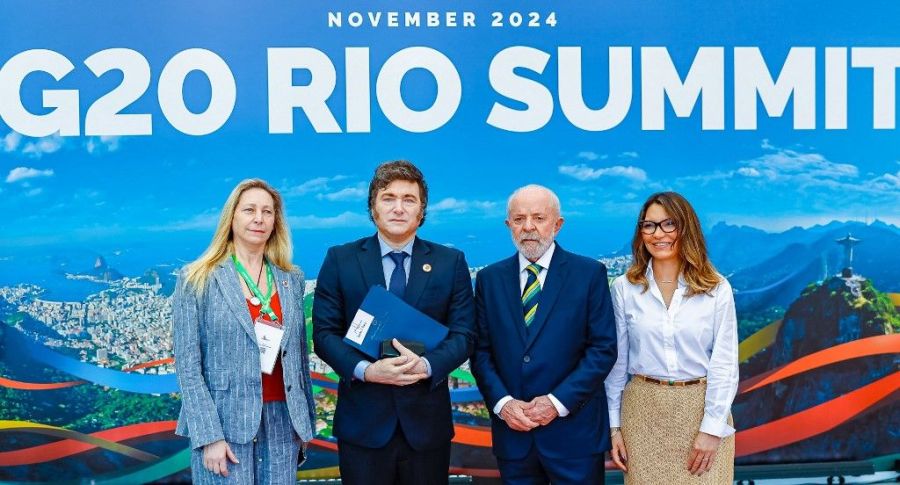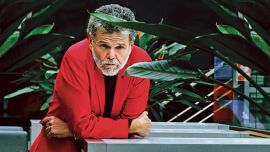In commercial terms, the world is in an uncertain scenario, with hollow statements and constant threats. It’s an "especially worrying" moment, says Julio Bitelli, Brazil’s ambassador to Argentina.
President Luiz Inácio Lula da Silva’s envoy in Argentina receives Perfil amid a context of global trade turmoil, marked by US President Donald Trump’s "tariff war," the rise of authoritarianism and attacks on multilateralism by the forces of an exacerbated nationalism. "The World Trade Organisation is not working and the global commercial rules are at risk," Bitelli warns.
Counter to the current trend, represented ideologically by a conservative wave in the region, Bitelli remains optimistic on regional integration. "In an uncertain world, Mercosur acquires importance as a bloc providing a certain stability," he argues, while recognising the buzz provoked by Javier Milei’s statements about his desire to negotiate a free-trade deal with the United States. It’s an issue which Bitelli says will be discussed at the next meeting of Mercosur foreign ministers on April 11.
Over a coffee, the Brazilian ambassador tells how, despite the enmity between President Javier Milei and Lula (they are still not on speaking terms), the bilateral relationship continues to "function normally." This is, in part, thanks to the constant contact between the two nations’ foreign ministers, including Argentina’s Gerardo Werthein, with whom Bitelli maintains a fluid relationship.
Brazil and Argentina’s link is "universally perceived" as important, he argues, over and above the ideological dictates of the Casa Rosada and Planalto presidential palaces, as sealed by Brasília’s ratification of support for the Malvinas (Falkland) Islands sovereignty claim and by the negotiations with the Nicolás Maduro administration in Venezuela over Argentina’s detained Border Guard Nahuel Gallo.
Finally, the ambassador explains the Brazilian business establishment’s take on Milei’s economic policies, while tackling the critique over the trade imbalance. "The issue of Argentina’s deficit would be solved with Vaca Muerta gas,” says Bitelli.
Can you comment on ex-president Jair Bolsonaro’s indictment for coup-mongering?
This is a strictly domestic issue for Brazil. The most important thing is that the institutions are working with a full democracy and ample rights of defence. All the legal procedures are being strongly, clearly and transparently respected with direct transmission so that people are in the know. In no way is this an issue for international policy – on the contrary, we do not deliver opinions on the judicial issues of other countries and we believe that each country should handle matters according to its laws. Of course, these are very important decisions from the political viewpoint, which is why everything needs to be done well, following the rules, as the Supreme Court is doing.
Considering the conservative wave in the region and the political mechanisms employed, could you give us a comparative reading? In Buenos Aires, for example, we have seen the visit of the director of an ultra-conservative think tank linked to Trump and the meeting between his campaign advisor Barry Bennett and [Milei’s top presidential advisor] Santiago Caputo. Furthermore, the attacks by digital militants against a Brazilian Supreme Court justice also seems a phenomenon which could be extrapolated.
There is surely a demonstration effect by that political sector made especially visible by periodic meetings with statements carrying great impact. Those people are looking at what is happening in Brazil for sure and there will be international reactions. There is a kind of solidarity between sectors of the same ilk and it is natural that it should be manifested with some overacting at times. There can be no doubt about that and it is normal that this should happen. While limited to opinions, tweets or personal discussions and while there is no interference by foreign governments in our system, it doesn't really matter. It’s all part of the great buzz with which we have to coexist today.
How do Trump’s tariff policies affect the relationship with Brazil?
I think that people are looking at the United States today in order to try and understand what the real trends are going to be. Things get announced and then change.
The Brazilian government’s stance is to maintain the good relationship we’ve always had. President Lula has made that clear from the start. We have taken the issue of the steel tariffs to the World Trade Organisation (WTO), the normal institutional channel, and we’ll see what happens there. The President has said, of course, that if there are harmful effects, Brazil has the right to adopt corresponding measures. But for now we’ll wait and see what happens.
Without getting dramatic, we will try to understand what is going on in the United States, and see which of the decisions really affect us and react from there according to our national interest.
The President [of Brazil] seems to be guided by a characteristic pragmatism in foreign policy, similar to China: to wait without confrontation and observe the development of events, as has also occurred with Javier Milei.
Of course. We’ll see to what degree Brazilian interests are affected and take decisions from there. President Lula has made it clear that it is in Brazil’s interest to maintain those good relations with the United States and that will be the main orientation. He even greeted President Trump on his election victory. The differences should not stand in the way of a relationship favourable to both.
The same goes for Argentina, it’s obvious that President Milei has a very different world-view but the relationship is too important to depend on that. That is why we are functioning normally to keep deepening that relationship as much as possible.
“It is healthy that Argentina should be contributing new ideas, giving oxygen to a Mercosur which in recent years has been passive and lacking ambition.”
What does “normally” mean within the bilateral relationship?
I have excellent contacts with the Argentine ministers who, in turn, have good relationships with their Brazilian counterparts. We’re working within Mercosur, beyond certain statements which have complicated the scenario. There are visits, something of an agenda and Argentina’s pro-tempore presidency [of Mercosur] is working. On April 11, there will be a meeting of Mercosur foreign ministers convened by Foreign Minister [Gerardo] Werthein. What I am hearing from all the ministers I meet is a recognition of the importance of the relationship with Brazil.
And that’s without mentioning the private and productive sectors or the governors – they all think the same, there is a universal perception of the importance of the bilateral relationship. So those differences between the presidents, which do exist and should not be minimised, need not affect the bilateral relationship. There is a huge effort to minimise the negative effect as much as possible.
President Lula has instructed me very clearly: the relationship between the countries is more important than the personal relationship between their presidents. And that’s the orientation. I’ve heard a top Argentine official say that President Milei thinks the same way.
How is the relationship between Lula and Milei?
The same as always. There was a very brief encounter in Rio de Janeiro [Ed: at the G20 summit in November, 2024]. Now we’re going to have the Mercosur summit here in June where they will have to meet again. But since then there have been no new contacts at the presidential level. At ministerial level there have been, as we know, Foreign Ministers [Mauro] Vieira and Werthein talk frequently and have a good relationship. The relationship is also good and fluid with me so we work well. It was a bit different with Diana [Mondino, the previous minister] because she had travelled to Brazil before taking office, generating a very positive personal relationship with both myself and Minister Vieira.
Argentina’s government is reportedly negotiating a commercial treaty with the United States and even speculating with a free-trade agreement (FTA). What is Brazil’s stance on that?
We still don’t know what that’s all about. There are references to an FTA but there does not seem to be room in the United States to negotiate agreements of that kind. Mercosur rules do not impede the signature of certain bilateral treaties, like the investment promotion agreements Brazil has with different countries.
The first thing is a better understanding of what we’re talking about. I have no knowledge of negotiations between Argentina and the United States over an agreement. So the meeting of foreign ministers will be an opportunity for Mercosur countries to have a better understanding of what we are talking about.
Mercosur's current rules need to be adapted and any decision requires consensus, which is Mercosur’s golden rule. Every member is absolutely free to bring along ideas, including changes in the rules, but that is something which has to be discussed and negotiated with a solution found.
Last month there was a meeting of national coordinators. Argentina presented a document which is being analysed by the foreign ministries. The meeting of April 11 will permit an exchange of opinions. But what I believe to be the most important is that Mercosur procedures be followed.
Even though Milei said that if they don’t like it, he’d pull Argentina out of the bloc.
Yes again, though one also looks at how other statements of the President have been reflected in practice once reaching the technical level, which is what truly determines the final solution.
Milei speaks of a free-trade agreement from a generic but not technical viewpoint. So I insist on it being important to know what we are talking about, to see if it fits into Mercosur rules and if that is not the case, whether Argentina will propose changes in Mercosur rules. How will the other countries react to those proposals? There is a whole procedure which must be followed.
How would you define the current state of Mercosur?
This is an important moment for accelerating Mercosur’s external agenda. While in Japan, Lula spoke of a possible agreement with that country, the negotiations with the European Union have been finalised and this week the Mercosur countries are meeting with the European Free Trade Association (EFTA). There are negotiations with Indonesia and the United Arab Emirates with Canada interested.
On the other hand, Argentina is discussing a new vision for the bloc – this is a time of important movements in Mercosur. It is true that Mercosur has a bad press because it is simplified to trade but everybody is seeking to make it more effective. It is healthy that Argentina should be contributing new ideas, giving oxygen to a Mercosur which in recent years has been passive and lacking ambition.

I would imagine that it needs to adapt to global changes to survive.
Of course, because the world is changing rapidly. This year is not only different from 2010 but also from 2022. In commerce, the entry of China as a partner has transformed the commercial guidelines for every country in the region. Today it is a highly important factor for every Mercosur country, something inconceivable 20 years ago.
At the same time we do not know where the trade policies of the United States are heading with statements of great impact from Trump like the sanctions against those buying oil from Venezuela with no clarity as to their concrete effects. What is there to say about those effects?
Today there is a level of uncertainty in terms of international trade which is especially worrying. The WTO [World Trade Organization] does not function as we would like and the rules of world trade are at risk. We do not know where we’re heading.
In an uncertain world, Mercosur acquires importance as a bloc which could be an element of certain stability. Although it has not lived up to its initial ambitions, there is something on which we all agree: improving its functioning requires dialogue and consensus contemplating the interests of all members. If a country decides to exit, the treaty provides procedure but each nation has the sovereignty to make its own decisions. Nobody is obliged to remain.
Has there been any advance with the export of Vaca Muerta gas since signing the memorandum at the G20 summit?
Yes, we’ve had many meetings. At the political level officials from Argentina’s Economy Ministry have met with Brazil’s Mining & Energy Ministry and the Argentine Energy secretary with Brazil’s oil and gas secretary. There have also been meetings at the technical level and they’re advancing well.
A report on those early meetings is expected at any moment and we’ll take it from there but it is an issue which greatly interests both countries. Argentina has a lot of gas with Vaca Muerta and Brazil needs a lot of gas so, as the gringos say, it's a ‘win-win’ situation. So we’re working with much dedication to giving practical results to those gas understandings.
Do you have any investments projected?
That is part of the process. I always say that Argentine gas for Brazil is like a giant jigsaw-puzzle and the memorandum was the central piece making everything else fit. Now the options must be evaluated. There is a preliminary contract for Vaca Muerta gas to reach Brazil in still modest quantities via the northern pipeline through Bolivia, which is already up and running, making it easier. But a more sustained alternative permitting greater volumes is up for discussion. There are different proposals: a gas pipeline to Uruguay, another crisscrossing Paraguay – an option pushed heavily by the Paraguayans – or a route via Uruguay. All these options require new gas pipeline extensions and are under analysis. The financing is another aspect under discussion with possibilities of our BNDES development bank participating among other options.
How does the Brazilian business establishment see the Argentine government's economic policies?
In general, the perception of the Brazilian productive sector is, in the first place, to recognise the important measures taken by this government to facilitate the activities of the productive sector like eliminating the famous SIRA import system or the PAÍS tax. Those are measures long sought by Brazilian businessmen and are now concrete reality – important steps already taken and moving in the right direction beyond any doubt. But the ‘cepo’ currency and capital controls still persist and nowadays are perhaps the biggest worry of people thinking of investing in Argentina.
But the Brazilian companies already in Argentina are generally interested in expanding their participation while those who are thinking of going international for the first time see Argentina as the most natural destination for that process. But I would say that today there is a “wait and see” attitude above all. It can perhaps be said that there is a cautious optimism as to the general direction things are taking but they are still waiting to see the results and the evolution of that economic policy, deciding from there whether to expand presence, investments, new branches and all that.
Regarding the movements of the real currency and its impact on bilateral trade, there exists a certain perception of imbalance. Is there any kind of strategy to improve the terms of trade?
This is another issue where, in general, simplifications prevent a slightly broader analysis of the commercial sector. It is very common to think that if we have a deficit with a country, then we should all go looking for surpluses with all the countries and all the partners and then the numbers don’t add up. A surplus or a deficit is equally natural – what we want is more commerce. The issue of the Argentine deficit in the trade balance would be solved with Vaca Muerta gas, ceasing to be a problem which sometimes causes more anxiety in Argentina than it deserves.
I see minor signs of recovery in bilateral trade, where we had reached almost US$40 billion around 2011 and then was almost halved at some stage. In the last couple of years it was around US$28 billion and I think that it could top that this year, according to the indications of the first months. But we are not looking for a surplus with Argentina but to expand trade. This is not a zero sum game where one wins and the other loses, we want both to gain.
“It's obvious that President Milei has a very different world-view but the relationship is too important to depend on that.”
Bearing in mind the uncertainty which dominates Argentine foreign policy today, the international support over the Malvinas [sovereignty] issue is a concern. If Argentina maintains its diplomatic U-turn in the United States, as in recent votes, do you think that could affect the support of countries which historically backed that cause, like Ecuador or Bolivia?
I would say that countries tend to behave in multilateral forums on the basis of reciprocity so that there is no doubt that the positions adopted by one country are reflected in the perception of other countries. But it can happen that this might cause, for example, certain votes or abstentions or less speeches with less emphasis or less explicit support.
Now I cannot see any change in objective position over such an important issue as the Malvinas. I do not see the support of those countries traditionally backing Argentina being at risk and, of course, from the Brazilian standpoint there is no risk of our changing our position, which has remained the same since 1833.
In that year, the head of the Brazilian delegation in London received instructions from the imperial government to accompany the representative of the United Provinces [of the River Plate] to protest the invasion of the islands to the British government and we haven’t changed our position since then. Yesterday I sent a message to the governor of the province of Tierra del Fuego, the Antarctic and the South Atlantic islands for April 2, reiterating that the Brazilian position will continue.
The Malvinas cause is a regional cause, we South Atlantic countries want to maintain it as a peace zone without foreign interference. Brazil will thus continue in that direction but, as I was saying, there is plenty of reciprocity in multilateralism.
Brazil represents the Argentine interests in Venezuela, is there any news about the situation of detained Border Guard Nahuel Gallo?
We know nothing about the Border Guard. As for those [opposition party members] trapped in the [Argentine] Embassy, we keep looking with the authorities in Caracas into a safe conduct permitting those people to leave Venezuela while we continue tackling the practical side. A fortnight ago their generator for electricity broke down and we had to negotiate with the Venezuelan government to change the unit but we managed it. It all requires a lot of energy, time and effort. But Brazil keeps doing what it has to do.
In conclusion, considering the international leadership of Brazil as a BRICS member and heavyweight of the global South, what is Brasília’s stance on the conflicts in Ukraine and in the Middle East?
We are looking at a new international order in formation, different from a few years ago. Brazil is seeking to maintain its tradition of not having enemies, without making lists of friends and adversaries and without having good relations with everybody. We believe that global governance is undergoing a very serious crisis and needs to be rethought. The UN Security Council in its current format is dysfunctional and needs changes.
We pay attention to what is going on in the world. In the case of Ukraine, President Lula warned two years ago that it was necessary to interrupt the combat and negotiate without preconditions. At the time he was criticised and accused of supporting one side or the other but today things seem to be advancing in that direction, which is the most important.
So we are in a changing world and we do not believe in a new Cold War because it is a simplification of the logic of then to apply it to the present. There is, of course, a new alignment with China as the central actor and Latin America should rethink its regional integration. There is increasingly more talk of Asia and the potential of Africa while Europe is losing ground. Our region has fallen behind in these great movements, which brings us back to the strategic importance of the Mercosur-European Union agreement, which goes beyond commerce.
In this new world, Brazil is seeking to preserve multilateralism, make global governance more effective and maintain good relations with everybody.






















Comments